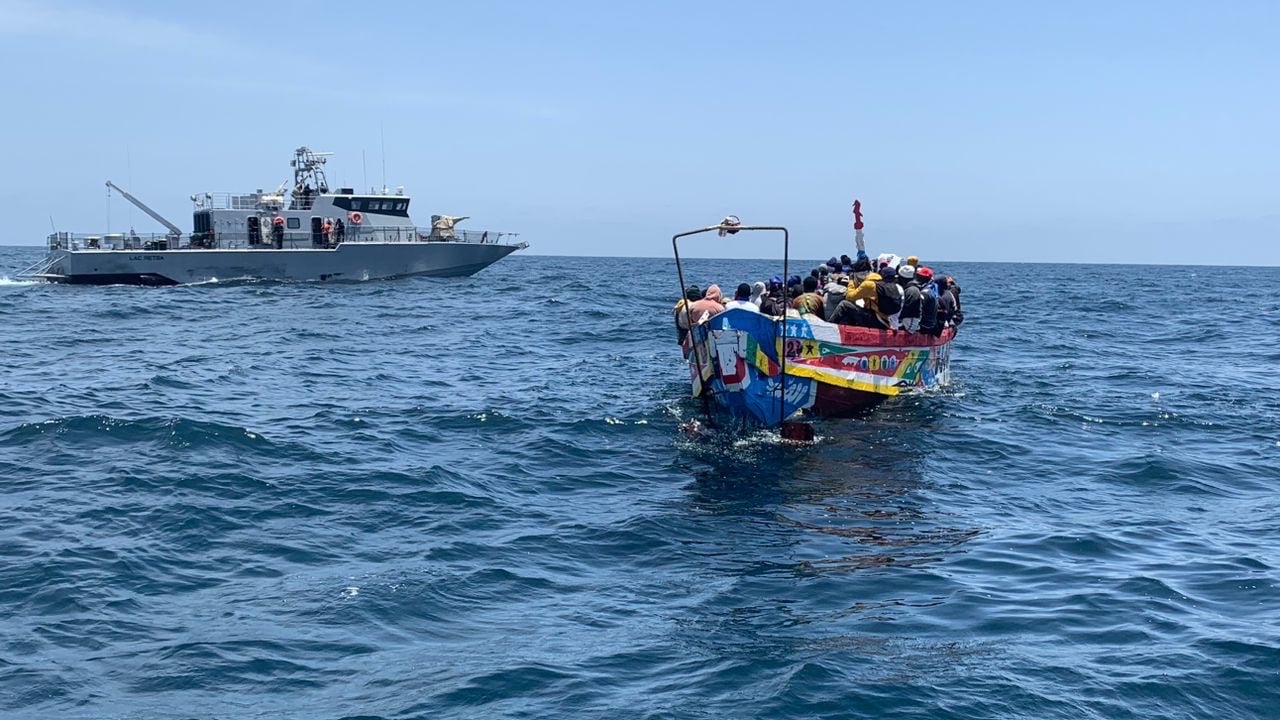Gambiaj.com – (DAKAR, Senegal) – Despite repeated crackdowns and rising death tolls at sea, The Gambia continues to serve as a critical departure point for irregular migration to Europe, with criminal networks operating with remarkable organization along the country’s coastline.
On Friday, October 17, 2025, Senegalese authorities intercepted a pirogue carrying 29 irregular migrants that had set sail from The Gambia.
The joint operation by the Gendarmerie and agents of the Joal-Fadiouth Marine Protected Area (MPA) revealed that the group—comprising 22 Gambians and 7 Senegalese—had been at sea for nearly a week attempting to reach Spain.
According to Lieutenant Socé Guèye, deputy curator of the Joal-Fadiouth MPA, the migrants faced engine trouble near Mauritania before attempting to turn back.
“We were informed, around 10 a.m., that a pirogue had left Gambia six days ago in an attempt to reach the Spanish coast (Canary Islands). Arriving at Mauritania, the migrants experienced engine problems and tried to turn back. It was at this point that they were reported and intercepted off the coast of Joal,” he explained.
The migrants were taken to the Joal Gendarmerie Research Brigade for questioning, though some—including the suspected captain—managed to flee before the interception.
“According to the information obtained, some took advantage of the damage to disembark on the Senegalese coast before our arrival,” Lieutenant Guèye confirmed.
This interception came just a day after another group of would-be migrants, who had also departed from The Gambia, was stopped further north.
On Thursday, October 16, the Territorial Brigade of the Gendarmerie arrested 16 people in the village of Pilote Bare, in the commune of Gandiole.
Acting on intelligence, the Saint-Louis Gendarmerie Legion, under the command of Colonel Mody Ka, picked up the group after their boat ran aground.
The migrants were identified as two Senegalese, eleven Guineans (including six women), one Ivorian, one Gambian, and one Malian.
Investigators confirmed that the group had set off from Barra in The Gambia before wandering at sea for several hours. Their arrest, authorities say, is part of Colonel Ka’s wider efforts to dismantle trafficking networks and combat illegal migration in the Saint-Louis zone.
Barely a week earlier, on October 10, the Senegalese Navy had intercepted a much larger boat carrying 124 people, the majority of them Gambians, also bound for Spain.
Investigations revealed the boat had departed Barra at around 3 a.m. before being stopped at sea roughly 50 nautical miles off the Gambian coast.
Among those detained were 85 Gambians, including 57 men, 11 women, and 17 minors. Five Gambian nationals—Yusufa Faye, Momodou Faye, Musa Joof, Seydina Alieu Nyang, and Arfang Ngum—were identified as “captains” of the canoe.
They later admitted their roles and named Suleyman, alias “Saul,” Abdoulie Bah, and Sanna Faye as key organizers of the smuggling network. The case has since been referred to the financial prosecutor’s office in Dakar.
These back-to-back operations underscore how Barra has become a nerve center of irregular migration along the Gambian coast.
Criminal syndicates recruit local youths as navigators, women and minors are increasingly among those risking the journey, and communities are left torn between economic despair and the lure of Europe.
For many Gambians, the dream of reaching Europe continues to outweigh the dangers of the Atlantic crossing—engine failures, overcrowded canoes, and the constant threat of drowning. Yet the growing frequency of interceptions in Senegalese and Mauritanian waters shows that regional authorities are tightening surveillance.
Still, as long as Barra and other Gambian coastal towns serve as active departure points and organized criminal groups remain entrenched, the dangerous exodus is unlikely to relent.










